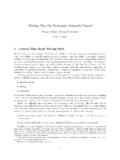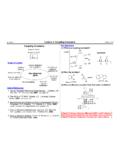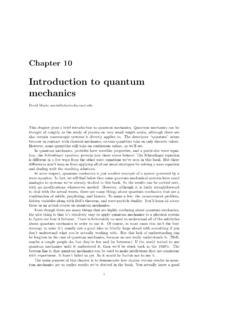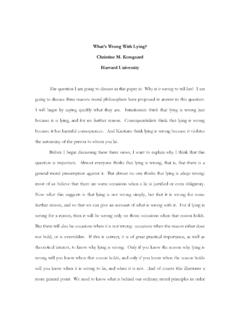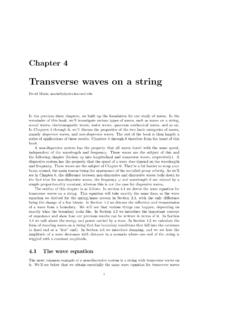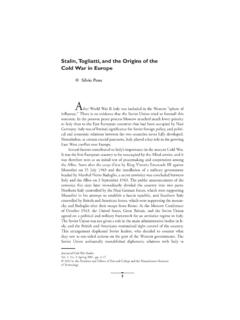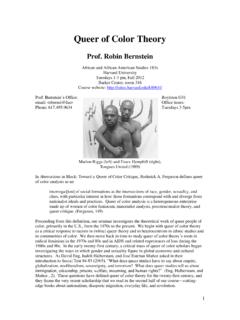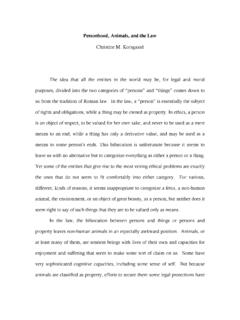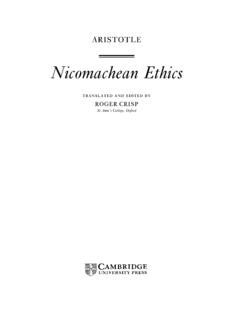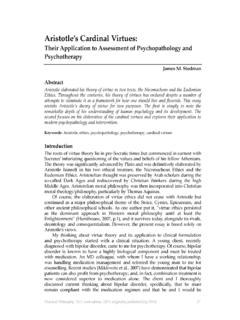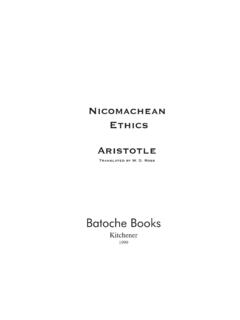Transcription of 4 Aristotle’s Function Argument - Harvard University
1 Christine M. Korsgaard V1 - 04/16/2008 4:15pm Page 129. 4. aristotle 's Function Argument 1. Introduction The purpose of the nicomachean ethics is to discover the human good, that at which we ought to aim in life and action. aristotle tells us that everyone calls this good eudaimonia (happiness, flourishing, well-being), but that people disagree about what it consists in (NE 1059a15ff). In , aristotle suggests that we might arrive at a clearer conception of happiness if we could first ascertain the ergon ( Function ) of a human being (NE 1097b24).
2 The justification of this line of inquiry is that for all things that have a Function or activity, the good and the well' is thought to reside in the Function '' (NE 1097b26 27). The compact Argument that follows establishes that the human Function is an active life of the element that has a rational principle'' (NE 1098a3 4). The human good therefore is the activity of the rational part of the soul performed well, which is to say, in accordance with virtue (NE 1098a15 17). aristotle 's Argument , which I will present in more detail in the next section, is a descendant of one offered by Plato at the end of the first book of the Republic (R 352d 354b).
3 Here Socrates is trying to establish that the just life is happiest and best, and he argues as follows. First of all, each thing has a Function , which is what one can do only or best with that thing (R 352e). Furthermore, everything that has a Function has a virtue, which enables it to perform its Function well (R 352b c). The Function of the soul is taking care of things, ruling, deliberating, and the like,'' since these are activities you could not perform with anything except your soul. A few lines later Socrates also proposes that living'' is a Function of the soul (R 353d).
4 Since the soul only performs its Function well if it has the virtue associated with its Function , a good soul rules, takes care of things, and in general lives'' well, while a bad soul does all this badly (R 353e). Since earlier arguments have supposedly established that justice is the virtue of the soul, Plato concludes that the just soul lives well, and therefore is blessed and happy, while an unjust one lives badly and so is wretched. Both versions of the Argument seem to depend on a connection between being a good person and having a good or happy life, and their aim is Christine M.
5 Korsgaard V1 - 04/16/2008 4:15pm Page 130. 130 Moral Virtue and Moral Psychology to connect both of these in turn to rationality. aristotle 's version of the Argument in particular has provoked a great deal of criticism, some of which I describe in the next section. In this essay, I offer an account of what aristotle means by Function '' and what the human Function is, drawing on aristotle 's metaphysical and psychological writings. I then reconstruct aristotle 's Argument in terms of the results. My purpose is to defend the Function Argument , and to show that when it is properly understood, it is possible to answer many of the objections that have been raised to it.
6 For reasons I will explain below, I think it is essential to make good sense of the Function Argument , because the theoretical structure of the nicomachean ethics collapses without it. Part of the defense is conditional, and shows only that if one held aristotle 's metaphysical beliefs, the Function Argument would seem as natural and obvious as it clearly seemed to him. But part of it is intended to be unconditional, and to show that, gien certain assumptions about reason and virtue, which, if not obvious, are certainly not crazy, the Function Argument is a good way to approach the question how to live well.
7 2. The Function Argument and its Critics aristotle opens his version of the Argument with these words: Presumably, however, to say that happiness is the chief good seems a platitude, and a clearer account of what it is is still desired. This might perhaps be given, if we could first ascertain the Function of man. For just as for a flute player, a sculptor, or any artist, and, in general, for all things that have a Function or activity, the good and the well'' is thought to reside in the Function , so it would seem to be for man, if he has a Function .
8 Have the carpenter, then, and the tanner certain functions or activities, and has man none? Is he naturally functionless? Or as eye, hand, foot, and in general each of the parts evidently has a Function , may one lay it down that man similarly has a Function apart from all these? (NE 1097b22 33). After quoting this remark, W. F. R. Hardie comments the obvious answer is that one may not, unless one is prepared to say that a man is an instrument FN:1 designed for some use.'' Only in light of controversial religious or metaphysical assumptions can we view human beings as having a Function , or being designed for a purpose.
9 We can read the passage quoted in either of two ways. We can read it as an expression of astonishment: What! All these other things have a Function , and a human being has none?'' Or we can read it as an Argument : bodily parts have functions, but that only makes sense if there is a Function of the whole W. F. R. Hardie, aristotle 's Ethical Theory, p. 23. Christine M. Korsgaard V1 - 04/16/2008 4:15pm Page 131. aristotle 's Function Argument 131. relative to which the parts have a Function ; the various trades and professions have functions, but that only makes sense if there is some general Function of human life to which they make a contribution.
10 Either way, the Argument seems to depend on a teleological conception of the world that we no longer accept: in the first case, the simple assignment of a purpose to everything; in the second, a form of reasoning from relative to absolute purposes that may FN:2 be illegitimate.. Even supposing that human beings do have a Function , it is unclear why the good for a human being should reside in the good performance of the human Function . Granted that a human being who performs the human Function well is (in some sense) a good human being, we can still ask whether it is good FN:3 for a human being to be a good human being.
